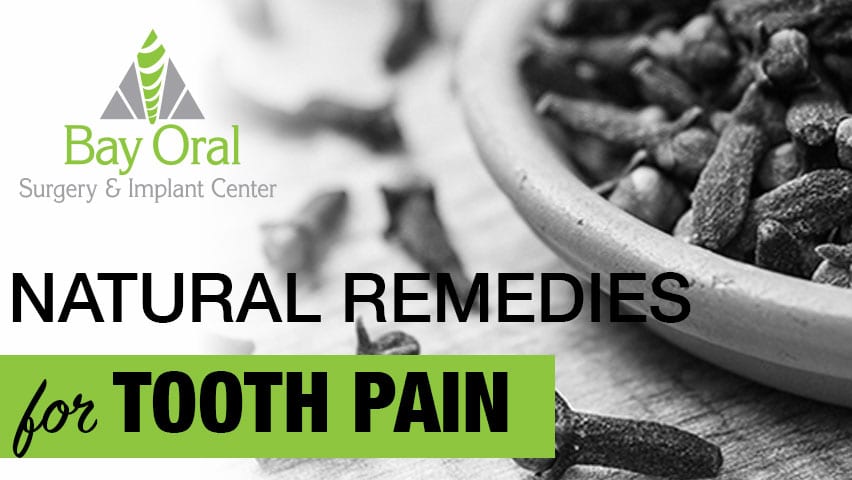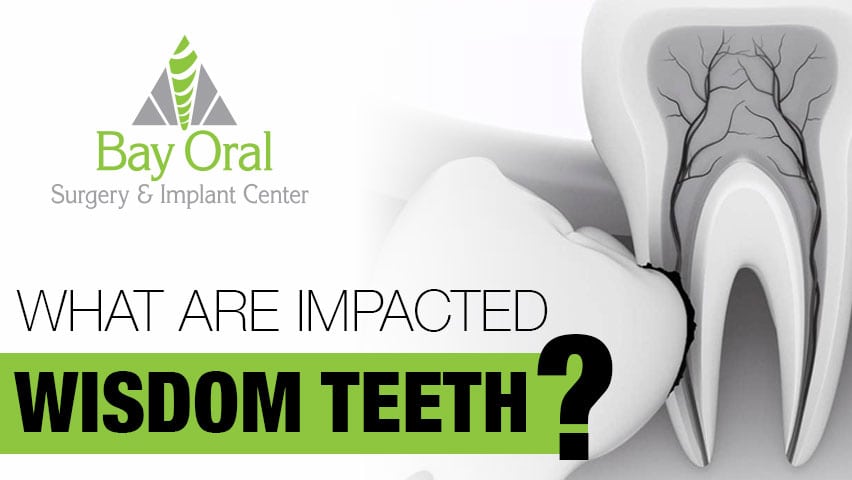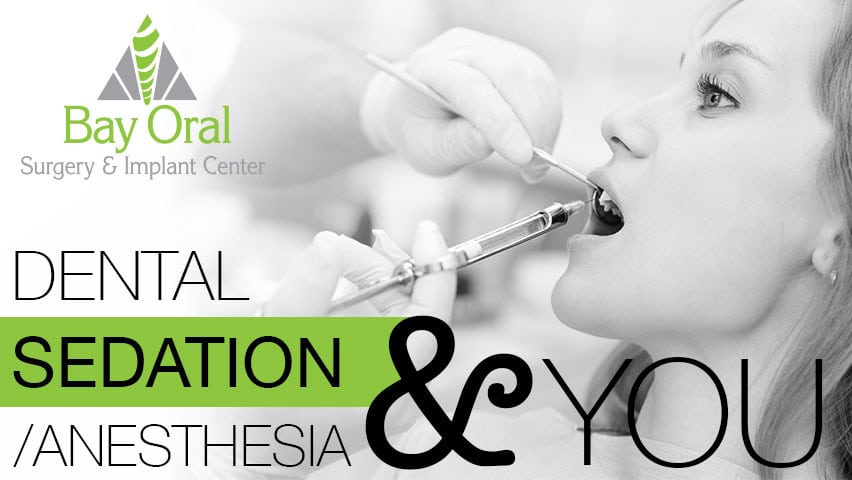
by Bay Oral Surgery | Nov 15, 2018 | Blog, Wisdom Teeth

Natural Remedies for Tooth Pain Relief
Toothaches don’t keep regular business hours. Unfortunately, it seems that oral discomfort often strikes at the most inconvenient times. However, you can take matters into your own hands when it comes to dealing with the pain. In fact, you may have solutions right in your own pantry or at your local health food store.
Clove
As discussed in a previous post, Wisdom Tooth Pain Remedies, one of the most effective natural remedies for tooth pain is clove. Not only is it an anti-inflammatory and antiseptic agent but it also serves as an anesthetic. While you can use whole cloves by placing them in your mouth near the pain until they soften and then gently grinding them with your teeth to release the clove oils in your mouth; you can also prepare a paste of ground cloves and olive oil or even purchase clove oil to apply to the affected area.
Garlic
Whether you love garlic or don’t care for it, this aromatic plant is renowned for its health benefits. It has been used to treat everything from high blood pressure to coronary heart disease. If you’re suffering from tooth pain, garlic also can help kill harmful bacteria and dull the ache. Try crushing a garlic clove into a paste and apply to the affected tooth and gum or gently chew a fresh clove of garlic.
Tea
Tea is not only a soothing drink; it can also help ease the pain of sensitive gums. A used tea bag applied to an aching gum may provide relief. You can use a still-warm tea bag, or put a used one in the freezer.
Whiskey or Vanilla Extract
Neat or on the rocks, whiskey is a guilty pleasure for many. However, whiskey is good for more than an old-fashioned. There’s a good reason for why generations of grandparents have suggested this unlikely cure for teething babies. When swished around a painful tooth, whiskey may help kill bacteria and numb the ache. Vanilla extract also contains alcohol and has similar healing and numbing properties. Dab a bit on a cotton ball or your fingers and apply to the painful area.
Yarrow
Yarrow is an herb that has been used medicinally for centuries. It is an anti-inflammatory and has been used to treat high blood pressure and improve circulation. It also contains the same pain-relieving properties found in aspirin. Rub yarrow oil on your tooth and gum to soothe a toothache.
Capsaicin / Cayenne Oil
Not for the faint of heart, capsaicin, which gives chili peppers their heat, can help numb nerve pain in your teeth. Add a few drops of cayenne oil to a cotton ball and rub it around the affected tooth. Just be sure to not get any of the burning oil on your tongue.
Activated Charcoal
For a less spicy cure, try mixing activated carbon, or charcoal, into a paste and apply to gauze and bite down on it.
If you have a toothache, there’s a good chance there’s a problem that needs to be treated professionally. While these natural remedies can provide relief at home, it’s still important to schedule an appointment with your dentist when pain strikes.

by Bay Oral Surgery | Sep 15, 2018 | Blog, Wisdom Teeth

Impacted teeth is a term used to describe when a tooth doesn’t come in or only emerges partially. This can happen for a number of reasons, but most commonly happens with your third molars or wisdom teeth. Your jaw might be too small, or overcrowded with no room for new teeth to break out. Teeth can also become tilted, twisted or disturbed as they attempt to emerge.
Symptoms of Impacted Teeth
Most cases of impacted teeth can be recognized by x-rays during regular dental visits before they ever even become a problem.
Other symptoms of tooth impaction include:
- Swelling gums in the back of your mouth
- Bleeding gums
- Difficulty and pain opening your jaw
- Bad breath and bad taste in your mouth
- Painful chewing and biting
- Headaches
- Swollen neck and shoulder glands
Are you experiencing the painful symptoms of wisdom tooth impaction? Check out our previous article on home remedies for treating wisdom tooth pain.
Types of Impacted Teeth
There are four types of impacted teeth that include horizontal impaction, vertical impaction, angular impaction, and partial eruption.

Horizontal Impaction is the most painful type of impaction as the tooth or teeth grow in sideways, fully beneath the gums. The tooth will move and grow horizontally, as the name implies, pushing forward on the molar in front of it. This type of impaction is diagnosed with x-ray and will likely cause damage to surrounding teeth and unbearable pain if it isn’t taken out. This extraction should be done under IV sedation or general anesthesia.
Vertical Impaction happens when the tooth is growing and erupting vertically but may be too close and rubbing against or pushing, from beneath, the molar next to it. It’s very likely that this type of impaction will erupt normally and most cases don’t require surgery to remove them.
Angular Impaction can happen one of two ways. Distal Impaction happens when the tooth is angled towards the back of the mouth. This is the most uncommon type of tooth impaction and is left up to the dentist or surgeon to determine whether it needs to be removed. That decision is mostly based on the angle and whether the tooth will eventually grow to impact the jaw bone.
Mesial Impaction is the opposite of Distal both that the tooth angles forward towards the front of the mouth, and that it is the most common type of tooth impactions. Mesial Impaction commonly accounts for Partial Eruptions as the back of the tooth erupts and the front is pressed against the anterior molar. This will typically be monitored to determine if extraction is necessary.
While all impacted teeth can cause discomfort, not all types of teeth impactions require immediate surgery. We recommend that you don’t wait until the pain becomes so intense that immediate emergency surgery is the only option. Schedule your appointment today with the experienced and knowledgeable surgeons at Bay Oral Surgery & Implant Center.

by Bay Oral Surgery | Aug 10, 2018 | Blog, Implants, Wisdom Teeth

There are three main types of sedation used in oral surgery; local anesthetic, IV sedation, and general anesthesia. It’s important to remember, with Bay Oral Surgery & Implant Center – all of our services are surgical in nature and will require some type of anesthesia, for that reason we think it’s important that you understand the different types of anesthesia commonly used in oral surgery. What they are, what they do and what type of dental anesthesia is right for your procedure.
Local
A local anesthetic is typically what you will find at your dentist office, having a tooth removed or having a cavity filled. It’s an injected drug that will temporarily numb a small area. While you will remain awake and aware during the procedure this type of anesthesia blocks the communication of your nerves to pain receptors in your brain, making you much more comfortable during a procedure.
Intravenous (IV) sedation
IV sedation is, as the name implies, typically taken through a vein. It works quickly to promote a sleep like state. Unlike General Anesthesia, you are still conscious with IV sedation and able to respond to visual signals. However, when you “wake up” after the procedure you will not remember any of it and will be quite groggy. Because of this, we require all patients to secure a safe ride home after any surgery and don’t recommend driving for at least 24 hours. IV sedation does not control pain so you can expect it to be used in combination with a local anesthetic.
General Anesthesia
General anesthesia uses a combination of IV and inhaled gasses to make a patient completely unconscious during a procedure in the hospital setting. Patients are unable to respond or feel any pain. This type of anesthesia is absolutely necessary for complex and traumatic dental surgeries, such as facial fractures, and is only administered in the hospital setting by an anesthesiologist.
Check out this page on our website for what to do and what not to do when preparing for sedation at Bay Oral Surgery & Implant Center. https://bayoralsurgery.com/sedation/ Contact us, if you have any questions or concerns about the sedation you will be receiving or the pre-op instructions.

by Bay Oral Surgery | Apr 18, 2018 | Blog, Wisdom Teeth

Are you experiencing pain and swelling that comes along with the arrival of your wisdom teeth?
Wisdom teeth, or third molars, generally surface during the late teenage to early adult years and can cause some real discomfort. We’ve listed some at-home pain remedies that can help alleviate some of the trouble that comes along with cutting new teeth, such as tender gums, and aching or throbbing pain.
Have Your Wisdom Teeth Removed
This one is probably pretty obvious and it’s not an at-home remedy, but it still should be mentioned. Most people will have their wisdom teeth removed to prevent future complications. By going to your regularly scheduled dentist visits, you should know early enough in advance if wisdom tooth extraction is necessary and have the procedure scheduled before any discomfort sets in.
Bay Oral Surgery & Implant Center specializes in this type of extraction. With locations in Green Bay, Marinette and Niagara we are one of the leading oral surgery centers in Green Bay, North East Wisconsin and surrounding areas. Schedule your consultation today!
Warm Salt Water Rinse
One of the easiest and most effective ways to ease wisdom tooth pain is by rinsing your mouth with the following: take one cup of warm water, add 1 teaspoon of salt and stir until the salt is completely dissolved. Swish this mixture in your mouth for about a minute before spitting it out. Repeat as necessary throughout the day.
This mouth rinse will also soothe other mouth sores, heal sore throats, freshen breath, and loosen and remove food.
Ice Pack
If you are having swelling use an icepack to help alleviate the pain and reduce inflammation. No ice pack? No problem! Putting ice cubes in a ziplock bag and covering it with a light towel will work just as well.
Benzocaine Topical Oral Pain Relief Products
Benzocaine products can be found at most pharmacies and can be helpful in numbing and dulling the pain to allow you to get through prolonged periods. Dry the area with a cloth before applying the gel or liquid to get the best results. Note: Benzocaine is not recommended for babies and children under 2.
Ibuprofen / Painkillers
Other pain relieving medications may also be helpful, but ibuprofen, being an anti-inflammatory analgesic, is usually most effective because the pain is likely caused by swelling.
Natural Pain Relief From Your Kitchen
There are a handful of other remedies out there that can be found right in your own kitchen. They include; clove, garlic, guava leaves, onions, cucumbers, tea, peppermint, vanilla extract and baking soda. We will expand on these natural remedies and how they work in a follow-up post. For now, the most common of these is Clove.
Clove is suggested by most as a wives-tale, but Clove may actually be one of the best kept secrets when relieving tooth pain. Not only does it numb the pain, it also has antibacterial and antiseptic properties that can help prevent an infection. Either use clove oil by dabbing on the area with a cotton ball, or place a whole clove (do not smash or cut) directly on the spot causing irritation until you start to experience a numbing sensation.
We hope you’re able to find some relief with one or some of these at-home remedies. If you are experiencing tooth pain but not sure if it could be wisdom tooth related – visit your dentist for a consultation, or contact Bay Oral Surgery today to schedule your wisdom teeth extraction.

by Bay Oral Surgery | Mar 19, 2018 | Blog, Implants, Wisdom Teeth

Not all dentist’s are created equal, but they all have a common goal, helping you have and keep a healthy mouth. Find out the different types of dental specialties and exactly what they do.
Pedodontics – Pediatric Dentist
While general dentists are allowed to treat patients of any age, pediatric dentists are specially trained to address specific needs and oral health of children and teens, like flouride treatments and dental sealants. Pediatric dentists will guide children and teens through their dental growth and development utilizing their training from infant oral health exams to space management after the premature loss of a primary tooth. They also offer other oral health related care like special counseling on nutrition, advice on teeth grinding, and discouragement of thumb and finger sucking.
Endodontist – The Tooth Root Doctor
Need a root canal? Endodontists are highly trained in the normal functions, causes and effects of dental disease and the relationship between the two, concerning the human dental pulp – that is, the center of the tooth, made up of living connective tissue and cells. And the tissues surrounding the root. They focus on prevention and treatment of injuries or diseases of the dental pulp; including pulpitis, “pulp stones”, or pulp exposure – all of which can be extremely painful or can lead to dental abscesses. Common treatment for dental pulp disease is the root canal therapy.
Oral & Maxillofacial Surgeons are orthopedic facial surgeons treating a wide variety of dental issues, from removal of impacted teeth, to dental implants, and reconstructive facial surgery. This specialty diagnoses and treats diseases, injuries and defects of both hard and soft tissue in the oral (mouth) and maxillofacial (jaw and face) region.
Our team, at Bay Oral Surgery & Implant Center, which includes Board Certified surgeons, practices a full scope of Oral and Maxillofacial surgery and have specialties ranging from corrective jaw surgery to wisdom tooth removal and dental extractions. We also diagnose and treat facial pain, facial injuries, and TMJ disorders; and perform a full range of dental implant and bone grafting procedures.
Orthodontist – The Alignment Dentist
Orthodontics deals with the diagnosis and treatment of misaligned or malpositioned teeth or jaws. Orthodontic dentists will correct misalignment of teeth, gaps, overbite or underbite, or other abnormalities of the jaw, bite or teeth, using non-surgical procedures. Correcting the bite and alignment of teeth will improve your smile but also affects the function and longevity of the teeth. There are a variety of orthodontic treatments including wires, braces, retainers, Invisalign® or other corrective appliances.
Periodontist – The Gum Specialist
Of all dental specialties, periodontists are dentists specializing in the care and prevention of gum-related diseases and the treatment of oral inflammation. Periodontists often treat more problematic cases or severe gum disease with a wide range of treatment including scaling and root planing – which is commonly thought of as a “Deep Cleaning” and involves thoroughly scaling all plaque, toxins and tartar deposits and then smoothing all of the rough areas on the root surface. Another common treatment would be root surface debridement, where damaged gum tissue is removed.
Periodontists are also specially trained in placement, maintenance and repair of dental implants.
Prosthodontist – The Restoration Dentist
A prosthodontist is certified in restoration and replacement of broken or missing teeth. Using crowns, bridges, or dentures, prosthodontists understand the dynamics of a smile and are trained to create replacements to address the oral function, comfort, appearance and oral health of patients with missing or deficient teeth. They also are one of the dental specialties that work in post oral cancer reconstruction, jaw joint problems, traumatic mouth injuries, and snoring and sleep disorders.







